2023年外研版中考英语一轮复习 第八节 八年级上册 Module 10 ~ Module 12课件(共62张PPT)
文档属性
| 名称 | 2023年外研版中考英语一轮复习 第八节 八年级上册 Module 10 ~ Module 12课件(共62张PPT) | 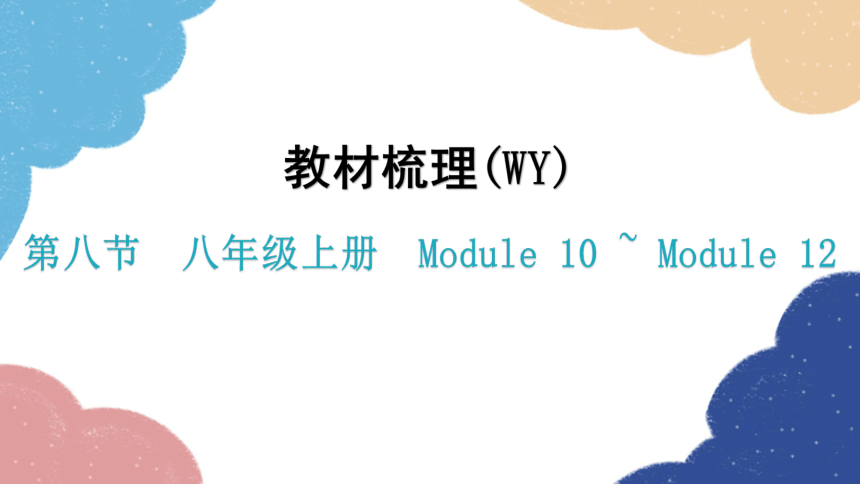 | |
| 格式 | pptx | ||
| 文件大小 | 545.6KB | ||
| 资源类型 | 教案 | ||
| 版本资源 | 外研版 | ||
| 科目 | 英语 | ||
| 更新时间 | 2023-06-07 16:48:20 | ||
图片预览

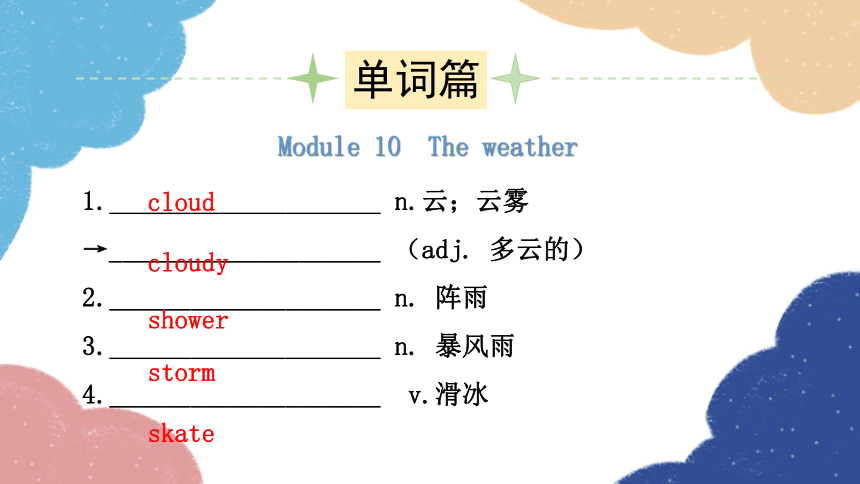
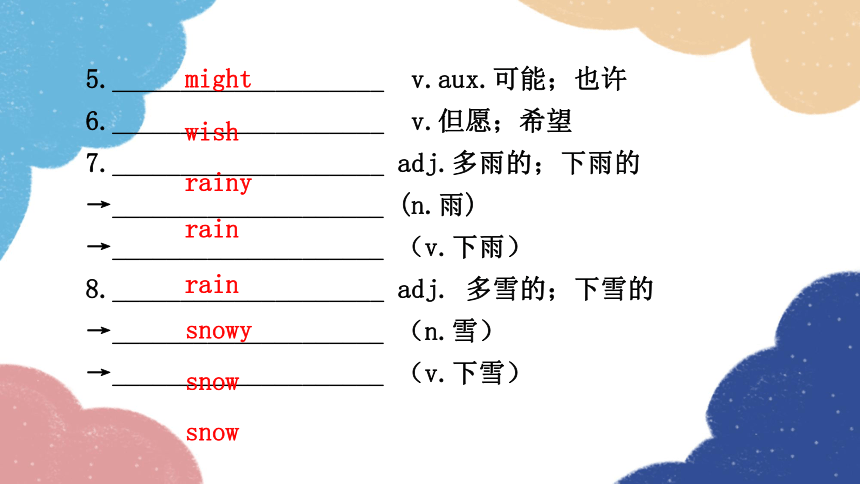
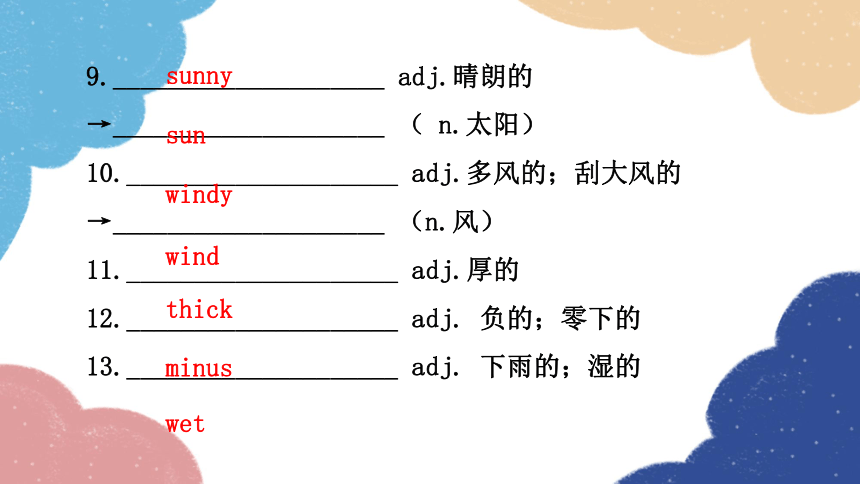
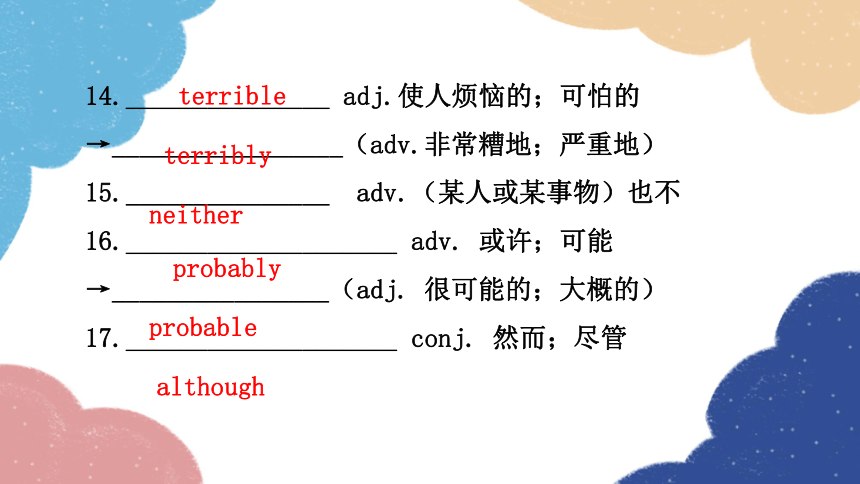
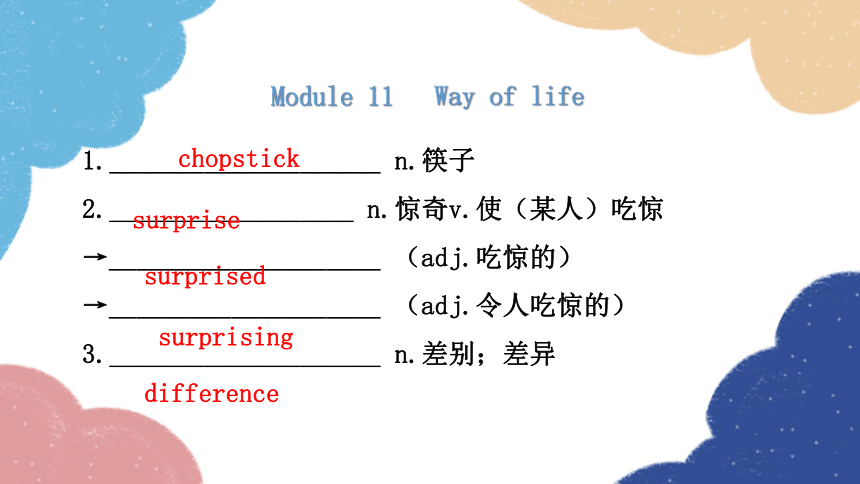
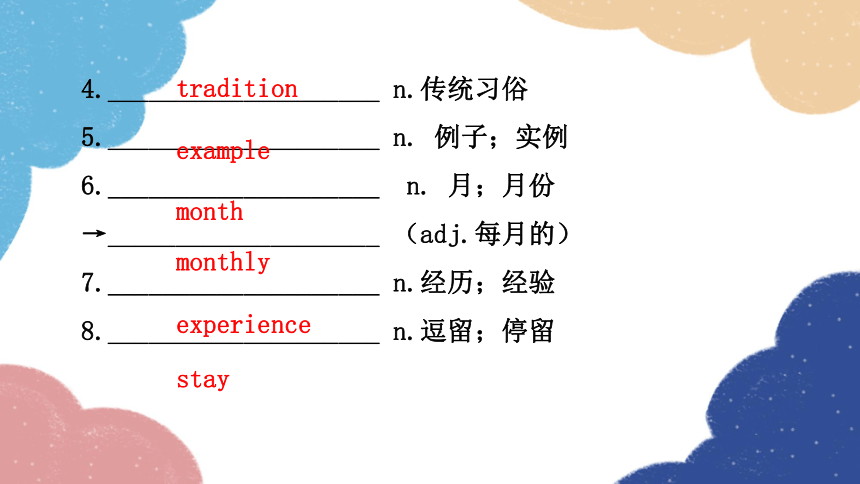
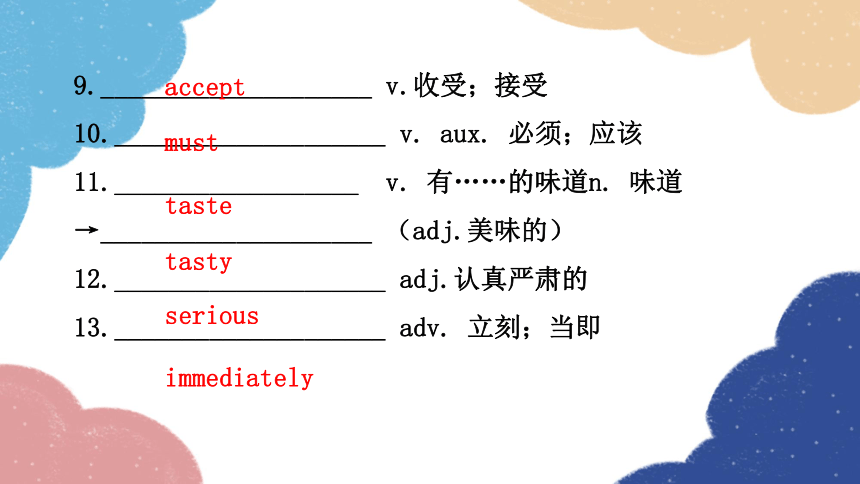
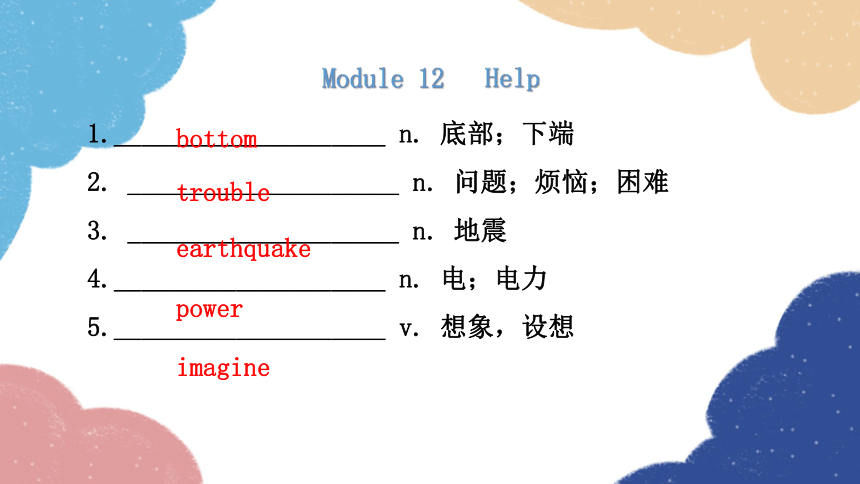
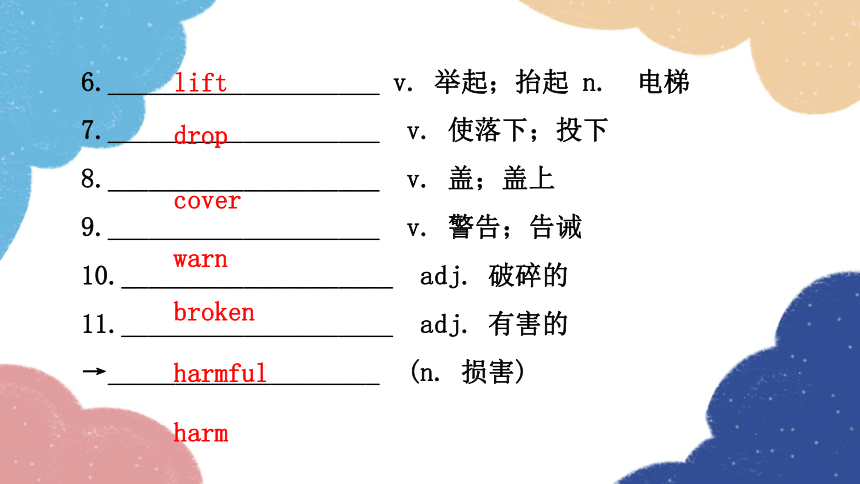
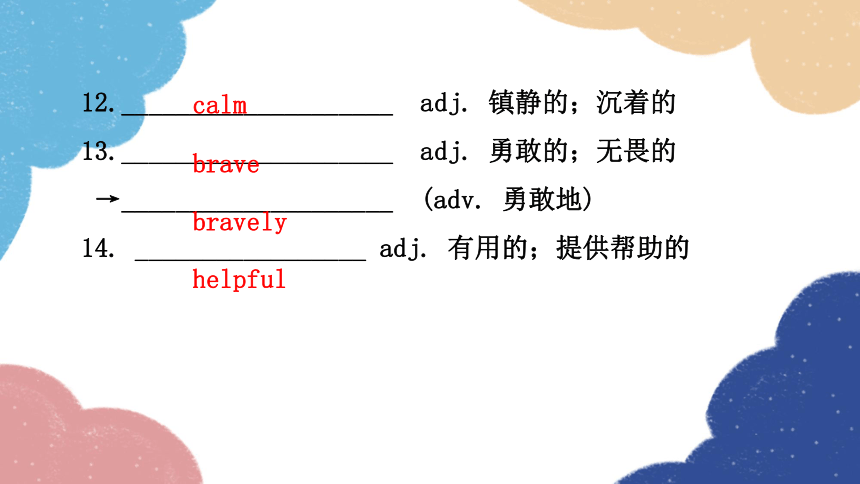
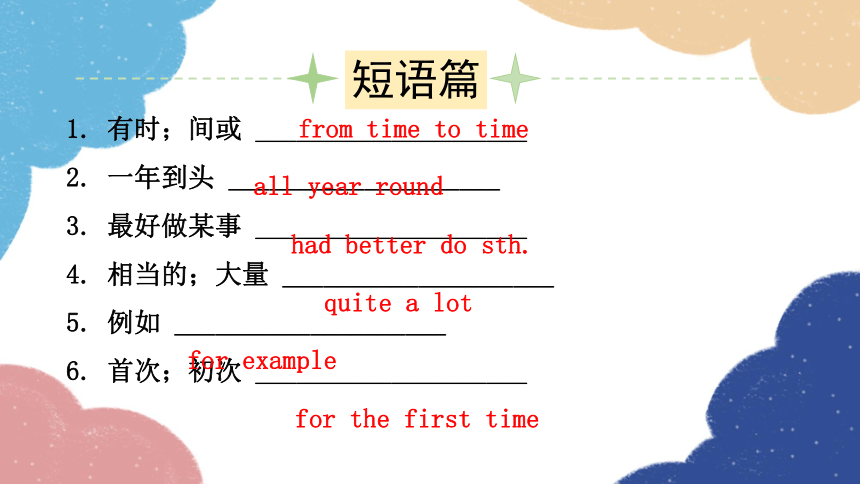
文档简介
(共62张PPT)
教材梳理(WY)
第八节 八年级上册 Module 10 ~ Module 12
Module 10 The weather
单词篇
1.____________________ n.云;云雾
→____________________ (adj. 多云的)
2.____________________ n. 阵雨
3.____________________ n. 暴风雨
4.____________________ v.滑冰
cloud
cloudy
shower
storm
skate
5.____________________ v.aux.可能;也许
6.____________________ v.但愿;希望
7.____________________ adj.多雨的;下雨的
→____________________ (n.雨)
→____________________ (v.下雨)
8.____________________ adj. 多雪的;下雪的
→____________________ (n.雪)
→____________________ (v.下雪)
might
wish
rainy
rain
rain
snowy
snow
snow
9.____________________ adj.晴朗的
→____________________ ( n.太阳)
10.____________________ adj.多风的;刮大风的
→____________________ (n.风)
11.____________________ adj.厚的
12.____________________ adj. 负的;零下的
13.____________________ adj. 下雨的;湿的
sunny
sun
windy
wind
thick
minus
wet
14._______________ adj.使人烦恼的;可怕的
→_________________(adv.非常糟地;严重地)
15._______________ adv.(某人或某事物)也不
16.____________________ adv. 或许;可能
→________________(adj. 很可能的;大概的)
17.____________________ conj. 然而;尽管
terrible
terribly
neither
probably
probable
although
Module 11 Way of life
1.____________________ n.筷子
2.__________________ n.惊奇v.使(某人)吃惊
→____________________ (adj.吃惊的)
→____________________ (adj.令人吃惊的)
3.____________________ n.差别;差异
chopstick
surprise
surprised
surprising
difference
4.____________________ n.传统习俗
5.____________________ n. 例子;实例
6.____________________ n. 月;月份
→____________________ (adj.每月的)
7.____________________ n.经历;经验
8.____________________ n.逗留;停留
tradition
example
month
monthly
experience
stay
9.____________________ v.收受;接受
10.____________________ v. aux. 必须;应该
11.__________________ v. 有……的味道n. 味道
→____________________ (adj.美味的)
12.____________________ adj.认真严肃的
13.____________________ adv. 立刻;当即
accept
must
taste
tasty
serious
immediately
Module 12 Help
1.____________________ n. 底部;下端
2. ____________________ n. 问题;烦恼;困难
3. ____________________ n. 地震
4.____________________ n. 电;电力
5.____________________ v. 想象,设想
bottom
trouble
earthquake
power
imagine
6.____________________ v. 举起;抬起 n. 电梯
7.____________________ v. 使落下;投下
8.____________________ v. 盖;盖上
9.____________________ v. 警告;告诫
10.____________________ adj. 破碎的
11.____________________ adj. 有害的
→____________________ (n. 损害)
lift
drop
cover
warn
broken
harmful
harm
12.____________________ adj. 镇静的;沉着的
13.____________________ adj. 勇敢的;无畏的
→____________________ (adv. 勇敢地)
14. _________________ adj. 有用的;提供帮助的
calm
brave
bravely
helpful
短语篇
1. 有时;间或 ____________________
2. 一年到头 ____________________
3. 最好做某事 ____________________
4. 相当的;大量 ____________________
5. 例如 ____________________
6. 首次;初次 ____________________
from time to time
all year round
had better do sth.
quite a lot
for example
for the first time
7. 带走 ____________________
8. 排队 ____________________
9. 急救 ____________________
10. 在……的底部 ____________________
11. 不和……接触 ____________________
12. 抬起;提起 ____________________
13. ……怎么了?______________________
14. 确保;确认 ____________________
take away
stand in a line
first aid
at the bottom of …
keep clear of …
lift up
What' s wrong with …?
make sure
课文篇
句式复习
1. 慎重选择要参观的地方和去(参观)的时间。
______________________________________________2. 带张地图,因为你可能想四处转转。
______________________________________________
3. 你不是认真的吧!
______________________________________________
Choose carefully the places to see and the time to go.
Bring a map because you may want to travel around.
You can' t be serious!
4. 比如,初次与人见面时,你必须称呼先生或女士。
__________________________________________________________________________________________
5. 但是他有可能难以听到你或者和你说话。
__________________________________________________________________________________________
For example, you must say Mr or Mrs when you meet someone for the first time.
But he could have trouble hearing you or speaking to you.
6. 地震总是发生得很突然,所以很难给予人们预警。
______________________________________________________________________________________
Earthquakes always happen suddenly, so it is difficult to warn people about them.
语篇再现
Passage 1
【八年级上册 Module 11】
Fish and chips is traditional food in England. You 1.__________ buy it and eat it in special fish and chip shops on the high street, or you can take it away and eat it with your fingers! It is delicious!
can
At the bus 2.__________, you must not push your way onto the bus. You 3.__________ to stand in a line and wait your turn. Sometimes people are slow to 4.__________ on the bus. Once I noticed a gentleman touch a young man on the shoulder, smile 5.__________ and say, “Excuse me! Are you waiting for this bus ” He was really polite.
stop
need
get
politely
Passage 2
【八年级上册 Module 12】
Inside
1 Do not jump out of high buildings.
2 Hide 1.______ a table. Stay away from windows and heavy furniture. Keep 2.__________ of fires.
3 Leave the building quickly when the ground stops 3.__________, but do not use the lift.
4 Keep 4.__________, especially when you are with other people. Be brave and be helpful.
under
clear
shaking
calm
Outside
1 Move away from buildings, because parts of a building 5.__________ fall on you.
2 Do not stand near street lights or under power lines.
3 Stay away from bridges and trees. If you are in a bus or car, stay in it.
4 In the mountains, be 6.__________ of falling rocks.
may
careful
5 On a beach, run away from the sea and move quickly to higher ground.
In 7.__________, follow what you learnt in school. You can be safe and you can also help save others.
short
考点篇
may, might,possible, probably
考点1
情态动词may / might表示“可能”【八年级上册 Module 10】
专练
根据句意,从方框中选择恰当的单词填空
1.It ____________________ be cold this evening, so you' d better wear more clothes.
may / might
2.Jane ________________ have a lot of work to do tomorrow, but she is not sure.
3.It is _______________ for us to finish the task in two hours.
4.Look at the blue and clear sky.It' ll ___________ be sunny later on.
may / might
possible
probably
点拨
情态动词may或might表示可能发生某事以及某人可能做某事,其后接动词原形。possible意为“可能的”,是形容词,其副词为possibly;probably意为“或许;可能”,是副词,其可能性比possibly要大。(详解见主书第一部分[第二节 动词])
考点2
neither, either和both的区别【八年级上册Module 10】
( )1. Either I or Lucy ___________ Mum ___________ the housework.
A. help; to B. helps; with C. help; with
专练
B
( )2. We asked John and Henry some easy questions, but ___________ of them could answer them.
A. either B. both C. neither
( )3. ___________ David ___________ Jessie come to my party. They are free.
A. Neither; nor B. Either; or C. Both; and
C
C
点拨
比较项 含义及用法
neither 指“两者中没有一个”,表示全部否定,常见搭配为:neither … nor …, 意为“既不……也不……”,连接两个主语时,谓语动词遵循“就近一致”原则
either 指“两者中的任意一个”,常见搭配为:either … or …, 意为“要么……要么……”,连接两个主语时,谓语动词遵循“就近一致”原则
比较项 含义及用法
both 指“两者都”,表肯定,常见搭配为:both … and …, 意为“既……又……”,连接两个主语时,谓语动词用复数
考点3
bring, take, carry和fetch的区别【八年级上册Module 10】
1.Please go into the room and ______________ me my raincoat.It' s raining outside.
2.Look! The robot is _____________ those heavy things.
专练
根据句意,用bring, take, fetch或carry的适当
形式填空
fetch
carrying
3.If you go to Shanghai, please _________ some clothes to my daughter.
4.Remember to __________ your dictionary here tomorrow.
take
bring
点拨
比较项 含义及用法
bring 意为“带来;取来”,指从别处把人或东西带来
take 意为“拿;取”,指把东西带走或拿走
carry 意为“拿;提;扛”,不强调方向
fetch 意为“(去)取来;拿来”,是一个往返的过程
考点4
情态动词must, can, need等【八年级上册Module 11】
1.There are too many nice sweaters,and I ___________ decide which one to choose.
2.If you don' t understand the questions, you _________ ask others to help you, but you __________ copy their homework.
专练
用适当的情态动词填空
can' t
can
mustn' t
3.We still have a lot of work to do, so you ____________________ wait for us.
needn' t
点拨
情态动词后接动词原形,没有人称和数的变化。其否定形式的构成是在情态动词后面加not。must意为“必须”,其否定形式mustn' t 意为“禁止”;can意为“能,能够”,其否定形式can' t意为“不能”;need意为“需要”,其否定形式needn' t意为“不必;不需要”。(详解见主书第一部分[第二节 动词])
1.The bad news didn' t ___________ him.
2.To my ______________, they gave me the task.
3.We were ______________ to know that she was from England.
4.It' s ____________________ that our team lost the basketball game.
考点5
surprise的用法【八年级上册 Module 11】
专练
根据句意,用surprise, surprised或surprising填空
surprise
surprise
surprised
surprising
(1)surprise作可数名词时,意为“惊奇;意外之事”;作不可数名词时,意为“惊奇;惊异”,常见搭配为:to one' s surprise 令某人吃惊的是……,in surprise 惊奇地;吃惊地。(2)surprise作动词时,意为“使(某人)吃惊”。(3)surprise的形容词有两个。surprised意为“感到吃惊的”,用来表达人的内在感受;surprising意为“令人吃惊的”,描述事物带来的感受。
点拨
( )1.Chris, ___________ me a hand.I can' t carry so many books.
A.gives B.is giving C.give
( )2.Boys,please ___________ look out of the window.Look at the blackboard.
A.don' t B.aren' t C.not
考点6
祈使句和情态动词must, can, could表示推测【八年级上册 Module 12】
专练
C
A
( )3.It is cold in the room.I think they ___________ have turned off the heating.
A.must B.ought to C.can
( )4. He hurt his leg. He __________ be in great pain.
A.could B.couldn' t C.can
A
A
情态动词could为can的过去式,用于表示能力时意为“能够”,用于表示推测时意为“可能”。情态动词must表示推测时意为“一定”。(详解见主书第一部分[第二节 动词])
点拨
演练篇
一、语法选择
Fifteen people ___1___ and three are missing because of heavy rains and flooding in Shanxi Province, the provincial government said on Tuesday.The downpour was caused by the unusual climatic conditions in ___2___ Yellow River basin. Neighbouring Shaanxi Province has also experienced ____3____ rainfall since 1961.
have died
the
the heaviest
The accumulated(积累的) rain water since ____4____ August is much more than the normal volume at this time of year. The central leadership is paying close attention ____5____ the situation. Weeks ago, an outline said flooding remains the biggest threat to people ____6____ in the Yellow River basin.The situation has become ____7____ this year
late
to
living
worse
because of extreme weather events. Usually, the Yellow River is flooded only in summer, but this year the flooding has continued ____8____ the autumn.
till
To deal with the flooding, the authorities need to make efforts both on the regional and national levels. ____9____ in Shanxi, more attention needs to be paid to information-sharing. Since most of ____10____ flooded areas are in the countryside, people there do not get much attention.
Especially
its
( )1. A. have been dying B. dies C. have died
( )2. A. the B. a C. an
( )3. A. the heaviest B. heavier C. heavy
( )4. A. late B. later C. lately
( )5. A. on B. to C. at
( )6. A. lived B. living C. to live
C
A
A
A
B
B
( )7. A. the worst B. badly C. worse
( )8. A. before B. till C. after
( )9. A. Especially B. Especial C. Specially
( )10. A. it' s B. it C. its
C
B
A
C
二、阅读理解(B篇)
Some birthday traditions are quite similar in many parts of the world, such as birthday cakes, birthday candles and birthday games. But some traditions are different and can only be seen in one country.
In Denmark, a flag is flown outside a window to show that someone who lives in that house is having a birthday. Presents are placed around the birthday child' s bed while he is sleeping, so he will see them when he wakes up.
Special year birthdays such as 5, 10, 15, 20, 21 are called “crown” years in Holland. An especially large gift was given on a crown year birthday. The family also decorates (装饰) the birthday child' s chair at the dining room with flowers, paper streamers (彩纸带) and balloons.
In Canada, the birthday child' s nose is greased (在……上涂油) with butter for good luck. The greased nose makes the child too slippery (滑的) for bad luck to catch him. In some parts of Canada, the birthday person even receives a punch (重拳击打) for good luck.
The birthday child receives a pull on the ear for each year in Brazil. The birthday person also gives the first piece of cake to his most special friend or relative, usually Mum or Dad.
In Korea, there is a big family party on the first birthday. The table is set with food and a few items such as a book, threads (线)and money. The item that the baby chooses is said to forecast his future:an excellent student, good with hands or richness.
In South Africa, on the twenty-first birthday, a key made of anything from paper to gold is presented by the parents as a sign that the child is ready to unlock the door to his future.
( )11. The following traditions are mentioned in the passage EXCEPT ___________.
A. receiving a pull on the face
B. having a big family party
C. greasing butter on the nose
D. giving a gift on a crown year birthday.
A
( )12. In which countries do people celebrate their 21st birthday specially
A. Canada and Korea.
B. Holland and South Africa.
C. Brazil and Holland.
D. Denmark and Korea.
B
( )13. Why is the birthday child' s nose greased with butter in Canada
A. Because it may bring a long life.
B. Because people believe that it may protect the child from bad luck.
C. Because it may help the child unlock the door to his future.
D. Because it is a sign that the child may have a lot of money in the future.
B
( )14. What does the underlined word “forecast” in Paragraph 6 mean
A. To know what happened in the past.
B. To know what is happening now.
C. To know what usually happens.
D. To know what will happen years later.
D
( )15. What does the passage mainly tell us
A.People in different countries have their own special birthday gifts.
B.People always have a big birthday party at home in different countries.
C.People in different countries celebrate their birthday in different ways.
D.People always know a one-year-old baby' s future from the item he chooses.
C
三、短文填空
Earthquakes happen very often in Tokyo, but Tokyo is not ____16____ unlucky city. Many special parks have been built in Tokyo to keep people ____17____ during earthquakes. These parks look nothing different from the other parks, but when earthquakes ____18____, they become life-saving places.
an
safe
happen / come
Many ____19____ things in those special parks can meet people' s basic needs. For ____20____, it is usually hard for people to get water after earthquakes. In the special parks, people can get drinking water from the water pump(水泵). ____21____ people need to use toilet, they can choose special toilets that can be used without water. What' s ____22____, if people need to cook in the parks, some special benches can help cook better.
useful
example
If / When
more
____23____, those useful things are not enough for people to face earthquakes. The most important part lies in training people. This will let people think and ____24____ faster during real earthquakes and let them protect ____25____ better.
However
move
themselves
16.__________ 17.__________
18.______________ 19.__________ 20.__________ 21.__________
22.__________ 23.__________
24.__________ 25.____________
an
safe
happen / come
useful
example
If / When
more
However
move
themselves
THANKS!
教材梳理(WY)
第八节 八年级上册 Module 10 ~ Module 12
Module 10 The weather
单词篇
1.____________________ n.云;云雾
→____________________ (adj. 多云的)
2.____________________ n. 阵雨
3.____________________ n. 暴风雨
4.____________________ v.滑冰
cloud
cloudy
shower
storm
skate
5.____________________ v.aux.可能;也许
6.____________________ v.但愿;希望
7.____________________ adj.多雨的;下雨的
→____________________ (n.雨)
→____________________ (v.下雨)
8.____________________ adj. 多雪的;下雪的
→____________________ (n.雪)
→____________________ (v.下雪)
might
wish
rainy
rain
rain
snowy
snow
snow
9.____________________ adj.晴朗的
→____________________ ( n.太阳)
10.____________________ adj.多风的;刮大风的
→____________________ (n.风)
11.____________________ adj.厚的
12.____________________ adj. 负的;零下的
13.____________________ adj. 下雨的;湿的
sunny
sun
windy
wind
thick
minus
wet
14._______________ adj.使人烦恼的;可怕的
→_________________(adv.非常糟地;严重地)
15._______________ adv.(某人或某事物)也不
16.____________________ adv. 或许;可能
→________________(adj. 很可能的;大概的)
17.____________________ conj. 然而;尽管
terrible
terribly
neither
probably
probable
although
Module 11 Way of life
1.____________________ n.筷子
2.__________________ n.惊奇v.使(某人)吃惊
→____________________ (adj.吃惊的)
→____________________ (adj.令人吃惊的)
3.____________________ n.差别;差异
chopstick
surprise
surprised
surprising
difference
4.____________________ n.传统习俗
5.____________________ n. 例子;实例
6.____________________ n. 月;月份
→____________________ (adj.每月的)
7.____________________ n.经历;经验
8.____________________ n.逗留;停留
tradition
example
month
monthly
experience
stay
9.____________________ v.收受;接受
10.____________________ v. aux. 必须;应该
11.__________________ v. 有……的味道n. 味道
→____________________ (adj.美味的)
12.____________________ adj.认真严肃的
13.____________________ adv. 立刻;当即
accept
must
taste
tasty
serious
immediately
Module 12 Help
1.____________________ n. 底部;下端
2. ____________________ n. 问题;烦恼;困难
3. ____________________ n. 地震
4.____________________ n. 电;电力
5.____________________ v. 想象,设想
bottom
trouble
earthquake
power
imagine
6.____________________ v. 举起;抬起 n. 电梯
7.____________________ v. 使落下;投下
8.____________________ v. 盖;盖上
9.____________________ v. 警告;告诫
10.____________________ adj. 破碎的
11.____________________ adj. 有害的
→____________________ (n. 损害)
lift
drop
cover
warn
broken
harmful
harm
12.____________________ adj. 镇静的;沉着的
13.____________________ adj. 勇敢的;无畏的
→____________________ (adv. 勇敢地)
14. _________________ adj. 有用的;提供帮助的
calm
brave
bravely
helpful
短语篇
1. 有时;间或 ____________________
2. 一年到头 ____________________
3. 最好做某事 ____________________
4. 相当的;大量 ____________________
5. 例如 ____________________
6. 首次;初次 ____________________
from time to time
all year round
had better do sth.
quite a lot
for example
for the first time
7. 带走 ____________________
8. 排队 ____________________
9. 急救 ____________________
10. 在……的底部 ____________________
11. 不和……接触 ____________________
12. 抬起;提起 ____________________
13. ……怎么了?______________________
14. 确保;确认 ____________________
take away
stand in a line
first aid
at the bottom of …
keep clear of …
lift up
What' s wrong with …?
make sure
课文篇
句式复习
1. 慎重选择要参观的地方和去(参观)的时间。
______________________________________________2. 带张地图,因为你可能想四处转转。
______________________________________________
3. 你不是认真的吧!
______________________________________________
Choose carefully the places to see and the time to go.
Bring a map because you may want to travel around.
You can' t be serious!
4. 比如,初次与人见面时,你必须称呼先生或女士。
__________________________________________________________________________________________
5. 但是他有可能难以听到你或者和你说话。
__________________________________________________________________________________________
For example, you must say Mr or Mrs when you meet someone for the first time.
But he could have trouble hearing you or speaking to you.
6. 地震总是发生得很突然,所以很难给予人们预警。
______________________________________________________________________________________
Earthquakes always happen suddenly, so it is difficult to warn people about them.
语篇再现
Passage 1
【八年级上册 Module 11】
Fish and chips is traditional food in England. You 1.__________ buy it and eat it in special fish and chip shops on the high street, or you can take it away and eat it with your fingers! It is delicious!
can
At the bus 2.__________, you must not push your way onto the bus. You 3.__________ to stand in a line and wait your turn. Sometimes people are slow to 4.__________ on the bus. Once I noticed a gentleman touch a young man on the shoulder, smile 5.__________ and say, “Excuse me! Are you waiting for this bus ” He was really polite.
stop
need
get
politely
Passage 2
【八年级上册 Module 12】
Inside
1 Do not jump out of high buildings.
2 Hide 1.______ a table. Stay away from windows and heavy furniture. Keep 2.__________ of fires.
3 Leave the building quickly when the ground stops 3.__________, but do not use the lift.
4 Keep 4.__________, especially when you are with other people. Be brave and be helpful.
under
clear
shaking
calm
Outside
1 Move away from buildings, because parts of a building 5.__________ fall on you.
2 Do not stand near street lights or under power lines.
3 Stay away from bridges and trees. If you are in a bus or car, stay in it.
4 In the mountains, be 6.__________ of falling rocks.
may
careful
5 On a beach, run away from the sea and move quickly to higher ground.
In 7.__________, follow what you learnt in school. You can be safe and you can also help save others.
short
考点篇
may, might,possible, probably
考点1
情态动词may / might表示“可能”【八年级上册 Module 10】
专练
根据句意,从方框中选择恰当的单词填空
1.It ____________________ be cold this evening, so you' d better wear more clothes.
may / might
2.Jane ________________ have a lot of work to do tomorrow, but she is not sure.
3.It is _______________ for us to finish the task in two hours.
4.Look at the blue and clear sky.It' ll ___________ be sunny later on.
may / might
possible
probably
点拨
情态动词may或might表示可能发生某事以及某人可能做某事,其后接动词原形。possible意为“可能的”,是形容词,其副词为possibly;probably意为“或许;可能”,是副词,其可能性比possibly要大。(详解见主书第一部分[第二节 动词])
考点2
neither, either和both的区别【八年级上册Module 10】
( )1. Either I or Lucy ___________ Mum ___________ the housework.
A. help; to B. helps; with C. help; with
专练
B
( )2. We asked John and Henry some easy questions, but ___________ of them could answer them.
A. either B. both C. neither
( )3. ___________ David ___________ Jessie come to my party. They are free.
A. Neither; nor B. Either; or C. Both; and
C
C
点拨
比较项 含义及用法
neither 指“两者中没有一个”,表示全部否定,常见搭配为:neither … nor …, 意为“既不……也不……”,连接两个主语时,谓语动词遵循“就近一致”原则
either 指“两者中的任意一个”,常见搭配为:either … or …, 意为“要么……要么……”,连接两个主语时,谓语动词遵循“就近一致”原则
比较项 含义及用法
both 指“两者都”,表肯定,常见搭配为:both … and …, 意为“既……又……”,连接两个主语时,谓语动词用复数
考点3
bring, take, carry和fetch的区别【八年级上册Module 10】
1.Please go into the room and ______________ me my raincoat.It' s raining outside.
2.Look! The robot is _____________ those heavy things.
专练
根据句意,用bring, take, fetch或carry的适当
形式填空
fetch
carrying
3.If you go to Shanghai, please _________ some clothes to my daughter.
4.Remember to __________ your dictionary here tomorrow.
take
bring
点拨
比较项 含义及用法
bring 意为“带来;取来”,指从别处把人或东西带来
take 意为“拿;取”,指把东西带走或拿走
carry 意为“拿;提;扛”,不强调方向
fetch 意为“(去)取来;拿来”,是一个往返的过程
考点4
情态动词must, can, need等【八年级上册Module 11】
1.There are too many nice sweaters,and I ___________ decide which one to choose.
2.If you don' t understand the questions, you _________ ask others to help you, but you __________ copy their homework.
专练
用适当的情态动词填空
can' t
can
mustn' t
3.We still have a lot of work to do, so you ____________________ wait for us.
needn' t
点拨
情态动词后接动词原形,没有人称和数的变化。其否定形式的构成是在情态动词后面加not。must意为“必须”,其否定形式mustn' t 意为“禁止”;can意为“能,能够”,其否定形式can' t意为“不能”;need意为“需要”,其否定形式needn' t意为“不必;不需要”。(详解见主书第一部分[第二节 动词])
1.The bad news didn' t ___________ him.
2.To my ______________, they gave me the task.
3.We were ______________ to know that she was from England.
4.It' s ____________________ that our team lost the basketball game.
考点5
surprise的用法【八年级上册 Module 11】
专练
根据句意,用surprise, surprised或surprising填空
surprise
surprise
surprised
surprising
(1)surprise作可数名词时,意为“惊奇;意外之事”;作不可数名词时,意为“惊奇;惊异”,常见搭配为:to one' s surprise 令某人吃惊的是……,in surprise 惊奇地;吃惊地。(2)surprise作动词时,意为“使(某人)吃惊”。(3)surprise的形容词有两个。surprised意为“感到吃惊的”,用来表达人的内在感受;surprising意为“令人吃惊的”,描述事物带来的感受。
点拨
( )1.Chris, ___________ me a hand.I can' t carry so many books.
A.gives B.is giving C.give
( )2.Boys,please ___________ look out of the window.Look at the blackboard.
A.don' t B.aren' t C.not
考点6
祈使句和情态动词must, can, could表示推测【八年级上册 Module 12】
专练
C
A
( )3.It is cold in the room.I think they ___________ have turned off the heating.
A.must B.ought to C.can
( )4. He hurt his leg. He __________ be in great pain.
A.could B.couldn' t C.can
A
A
情态动词could为can的过去式,用于表示能力时意为“能够”,用于表示推测时意为“可能”。情态动词must表示推测时意为“一定”。(详解见主书第一部分[第二节 动词])
点拨
演练篇
一、语法选择
Fifteen people ___1___ and three are missing because of heavy rains and flooding in Shanxi Province, the provincial government said on Tuesday.The downpour was caused by the unusual climatic conditions in ___2___ Yellow River basin. Neighbouring Shaanxi Province has also experienced ____3____ rainfall since 1961.
have died
the
the heaviest
The accumulated(积累的) rain water since ____4____ August is much more than the normal volume at this time of year. The central leadership is paying close attention ____5____ the situation. Weeks ago, an outline said flooding remains the biggest threat to people ____6____ in the Yellow River basin.The situation has become ____7____ this year
late
to
living
worse
because of extreme weather events. Usually, the Yellow River is flooded only in summer, but this year the flooding has continued ____8____ the autumn.
till
To deal with the flooding, the authorities need to make efforts both on the regional and national levels. ____9____ in Shanxi, more attention needs to be paid to information-sharing. Since most of ____10____ flooded areas are in the countryside, people there do not get much attention.
Especially
its
( )1. A. have been dying B. dies C. have died
( )2. A. the B. a C. an
( )3. A. the heaviest B. heavier C. heavy
( )4. A. late B. later C. lately
( )5. A. on B. to C. at
( )6. A. lived B. living C. to live
C
A
A
A
B
B
( )7. A. the worst B. badly C. worse
( )8. A. before B. till C. after
( )9. A. Especially B. Especial C. Specially
( )10. A. it' s B. it C. its
C
B
A
C
二、阅读理解(B篇)
Some birthday traditions are quite similar in many parts of the world, such as birthday cakes, birthday candles and birthday games. But some traditions are different and can only be seen in one country.
In Denmark, a flag is flown outside a window to show that someone who lives in that house is having a birthday. Presents are placed around the birthday child' s bed while he is sleeping, so he will see them when he wakes up.
Special year birthdays such as 5, 10, 15, 20, 21 are called “crown” years in Holland. An especially large gift was given on a crown year birthday. The family also decorates (装饰) the birthday child' s chair at the dining room with flowers, paper streamers (彩纸带) and balloons.
In Canada, the birthday child' s nose is greased (在……上涂油) with butter for good luck. The greased nose makes the child too slippery (滑的) for bad luck to catch him. In some parts of Canada, the birthday person even receives a punch (重拳击打) for good luck.
The birthday child receives a pull on the ear for each year in Brazil. The birthday person also gives the first piece of cake to his most special friend or relative, usually Mum or Dad.
In Korea, there is a big family party on the first birthday. The table is set with food and a few items such as a book, threads (线)and money. The item that the baby chooses is said to forecast his future:an excellent student, good with hands or richness.
In South Africa, on the twenty-first birthday, a key made of anything from paper to gold is presented by the parents as a sign that the child is ready to unlock the door to his future.
( )11. The following traditions are mentioned in the passage EXCEPT ___________.
A. receiving a pull on the face
B. having a big family party
C. greasing butter on the nose
D. giving a gift on a crown year birthday.
A
( )12. In which countries do people celebrate their 21st birthday specially
A. Canada and Korea.
B. Holland and South Africa.
C. Brazil and Holland.
D. Denmark and Korea.
B
( )13. Why is the birthday child' s nose greased with butter in Canada
A. Because it may bring a long life.
B. Because people believe that it may protect the child from bad luck.
C. Because it may help the child unlock the door to his future.
D. Because it is a sign that the child may have a lot of money in the future.
B
( )14. What does the underlined word “forecast” in Paragraph 6 mean
A. To know what happened in the past.
B. To know what is happening now.
C. To know what usually happens.
D. To know what will happen years later.
D
( )15. What does the passage mainly tell us
A.People in different countries have their own special birthday gifts.
B.People always have a big birthday party at home in different countries.
C.People in different countries celebrate their birthday in different ways.
D.People always know a one-year-old baby' s future from the item he chooses.
C
三、短文填空
Earthquakes happen very often in Tokyo, but Tokyo is not ____16____ unlucky city. Many special parks have been built in Tokyo to keep people ____17____ during earthquakes. These parks look nothing different from the other parks, but when earthquakes ____18____, they become life-saving places.
an
safe
happen / come
Many ____19____ things in those special parks can meet people' s basic needs. For ____20____, it is usually hard for people to get water after earthquakes. In the special parks, people can get drinking water from the water pump(水泵). ____21____ people need to use toilet, they can choose special toilets that can be used without water. What' s ____22____, if people need to cook in the parks, some special benches can help cook better.
useful
example
If / When
more
____23____, those useful things are not enough for people to face earthquakes. The most important part lies in training people. This will let people think and ____24____ faster during real earthquakes and let them protect ____25____ better.
However
move
themselves
16.__________ 17.__________
18.______________ 19.__________ 20.__________ 21.__________
22.__________ 23.__________
24.__________ 25.____________
an
safe
happen / come
useful
example
If / When
more
However
move
themselves
THANKS!
